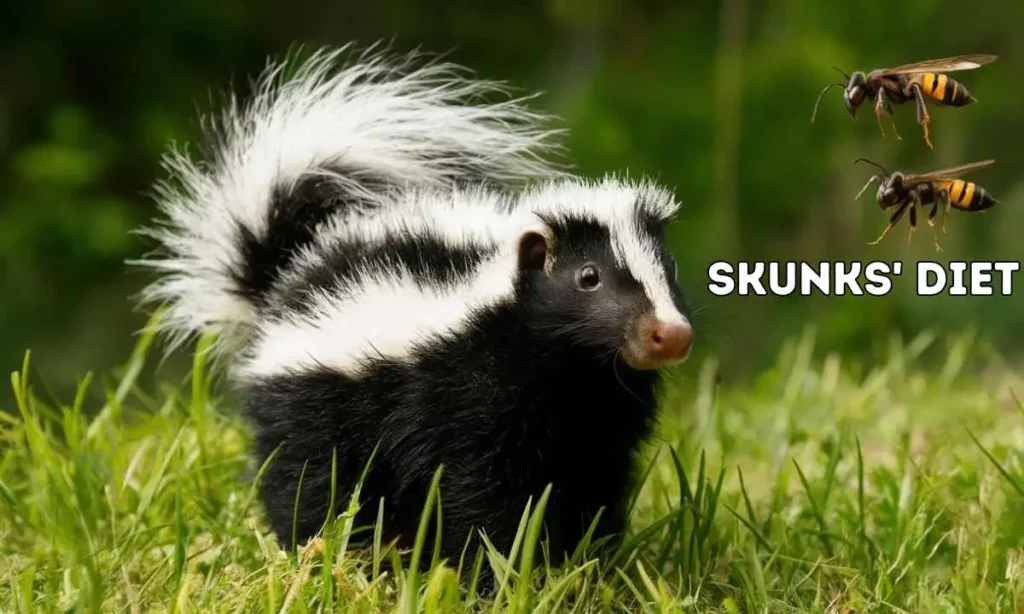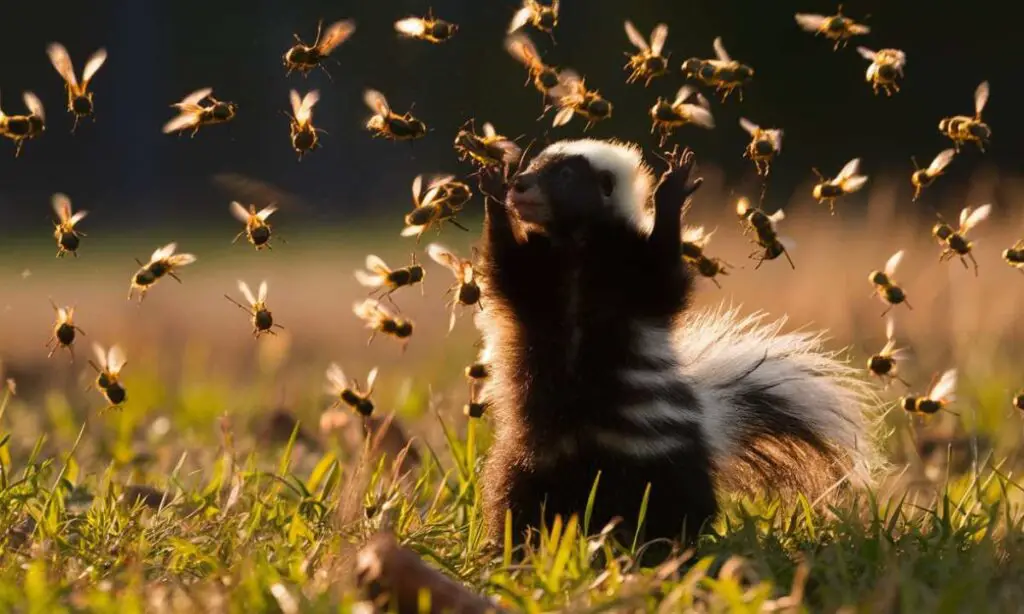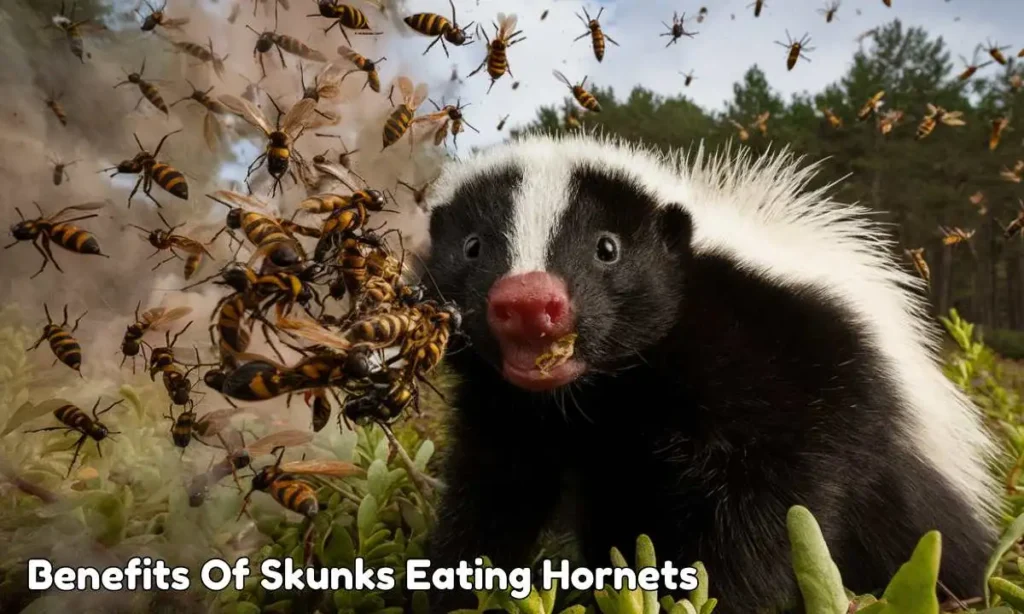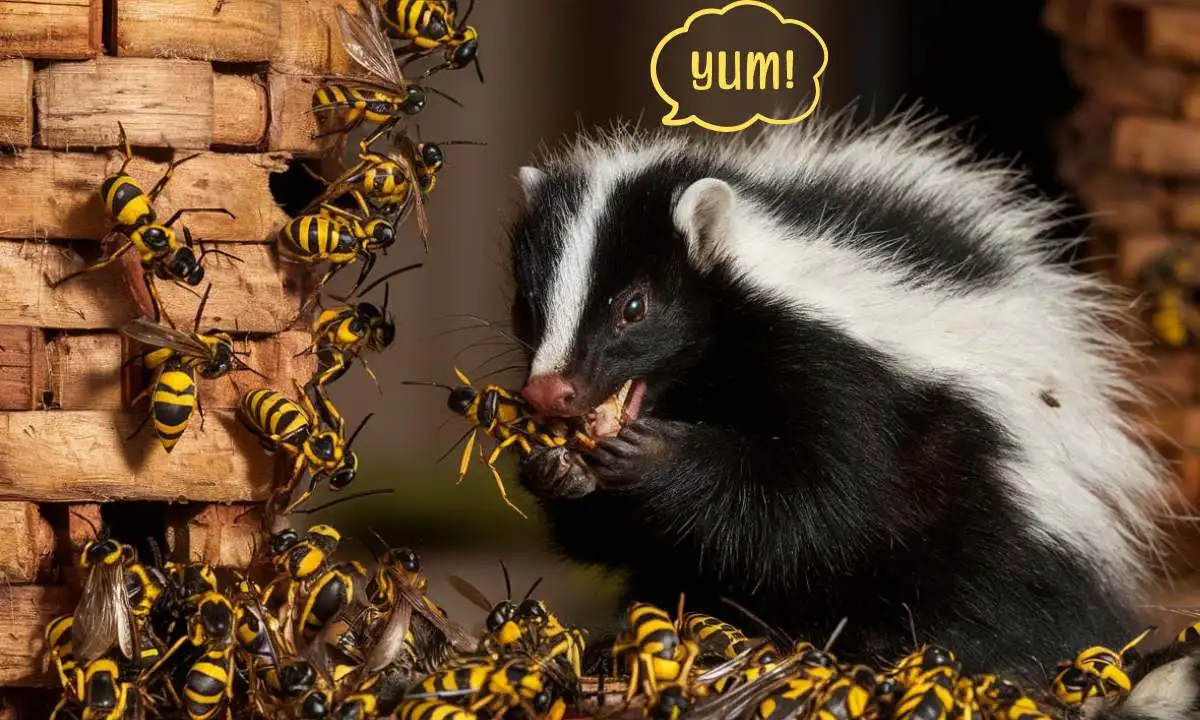Do Skunks Eat Hornets
Last updated on August 11th, 2024 at 07:30 am
Yes, skunks eat hornets and their larvae! My experience as a skunk pet owner and wildlife enthusiast has taught me some cool things about these striped animals. Skunks use their strong paws to dig up hornet nests and enjoy a crunchy meal. They’re great at controlling pest populations, and their thick fur helps them handle stings. Read on to learn how skunks can help with hornet problems in your backyard!
Skunks’ Diet
Many people wonder about the diet of skunks, including if they eat hornets. Skunks are interesting creatures with diverse eating habits. This blog dives into what skunks eat and the factors influencing their diet.

What Skunks Eat
Skunks are not picky eaters. Their diet can change with the seasons. Here are some foods skunks enjoy:
- Fruits like berries and apples.
- Small rodents, which they find tasty.
- Insects, including hornets, are a big part of their diet.
- Worms and larvae provide them with protein.
- They also eat plants and eggs when they find them.
Skunks use their sharp claws to dig for insects and worms. They are also known to attack beehives for honey and larvae. So, yes, skunks do eat hornets, especially when other food is scarce.
Factors That Affect Skunks’ Diet
Several things can change what skunks eat. Here are the main factors:
- Season: In spring and summer, they eat more insects and fruits.
- Location: Skunks in cities might eat garbage and pet food.
- Availability of food: If one food is hard to find, they switch to another.
- Age and health: Young and sick skunks might not hunt much.
Skunks adapt their diet based on these factors. For example, during winter, when insects are hard to find, skunks might eat more plants and rodents. This flexibility helps them survive in many environments.
Skunks And Hornets Interaction

Many people wonder about the eating habits of skunks. Specifically, whether skunks eat hornets is a curious question. Skunks are known for their ability to spray a strong-smelling liquid. Hornets are famous for their painful stings. It may seem unlikely, but these two creatures do have interactions in nature.
Do Skunks Eat Hornets
Skunks are omnivores, which means they eat both plants and animals. One of the lesser-known facts about skunks is that they do eat hornets and other insects. This is part of their diet. Skunks have a method to deal with hornets that is quite clever.
- Skunks have thick fur that protects them from stings.
- They can dig up hornet nests from the ground.
- Their quick movements allow them to avoid being stung.
Skunks often attack hornet nests at night. Hornets are less active then, so it is safer for skunks. This shows how smart skunks are in finding food.
Why Skunks Eat Hornets
There are several reasons why skunks may choose to eat hornets. The main reason is that hornets are a good source of protein. This is important for a skunk’s diet. Skunks need protein to stay healthy and strong.
| Reason | Explanation |
|---|---|
| Protein Source | Hornets provide protein which helps skunks grow. |
| Abundant Food | Hornets’ nests are common and easy for skunks to find. |
| Hunting Skills | Eating hornets helps skunks practice their hunting skills. |
Eating hornets is natural for skunks. It helps them survive in the wild. Skunks may also eat hornets to control the insect population. This is good for the environment.
Potential Risks Of Skunks Eating Hornets
Skunks are curious creatures known for their bold diets. They often tackle pests like hornets. Understanding the risks involved with skunks eating hornets is crucial. This behavior can lead to various health issues for these small mammals. Let’s explore what happens when skunks decide to snack on these stinging insects.
Stings And Injuries
Skunks face several dangers when they eat hornets. Their thick fur offers some protection. But they can still get stung, especially around their eyes, nose, and mouth. These areas are very sensitive. A sting can be very painful and even cause swelling. Here are more risks:
- Multiple stings: Hornets attack
Benefits Of Skunks Eating Hornets

Many wonder if skunks eat hornets. Indeed, they do, and this has benefits. Skunks help control hornet populations, which can be pesky. This eating habit is a natural way to keep hornets in check. Let’s dive into how skunks eating hornets benefits the environment.
Natural Pest Control
Skunks search for food at night. They enjoy eating various pests, including hornets. This is good for gardens and farms. Here’s why:
- Skunks eat hornet larvae, which are found in nests.
- This action reduces the number of new hornets growing up.
- With fewer hornets, plants and crops are safer. Hornets can damage them.
- People and animals get stung less by hornets, thanks to skunks.
By eating hornets, skunks act as natural pest controllers. This helps everyone.
Reduced Population Of Hornets
Skunks eating hornets leads to fewer hornets. Here’s how this benefits the environment:
- Less competition for bees: Bees are important for pollination. Fewer hornets mean bees can work better.
- More balanced ecosystems: With fewer hornets, other species can thrive. This balance is good for nature.
- Hornets sometimes eat bees and other helpful insects. Skunks help protect these insects by eating hornets.
- Less need for chemical pesticides: With natural control, we use fewer chemicals. This is healthier for the earth.
So, skunks eating hornets helps in many ways. It keeps hornet numbers down, which is good for all.
Frequently Asked Questions
Yes, skunks do eat hornets and wasps, as they are omnivores and their diet includes various insects.
Several bird species, such as the bee-eater and the European honey buzzard, prey on hornets. Some amphibians and mammals also consume hornets when the opportunity arises.
Bears are known for digging up hornet nests. They do this to eat the larvae inside, despite the risk of stings. This behavior showcases their strong immunity to venom and their search for protein-rich food sources.
Bears are known for digging up hornet nests. They do this to eat the larvae inside, despite the risk of stings. This behavior showcases their strong immunity to venom and their search for protein-rich food sources.
Conclusion
In wrapping up, skunks do indeed have hornets on their menu. This surprising dietary choice helps control the hornet population—Nature’s balance benefits from this unlikely predator-prey relationship. Remember, skunks provide more than their notorious scent; they’re integral to our ecosystem.
Keep exploring wildlife wonders!

